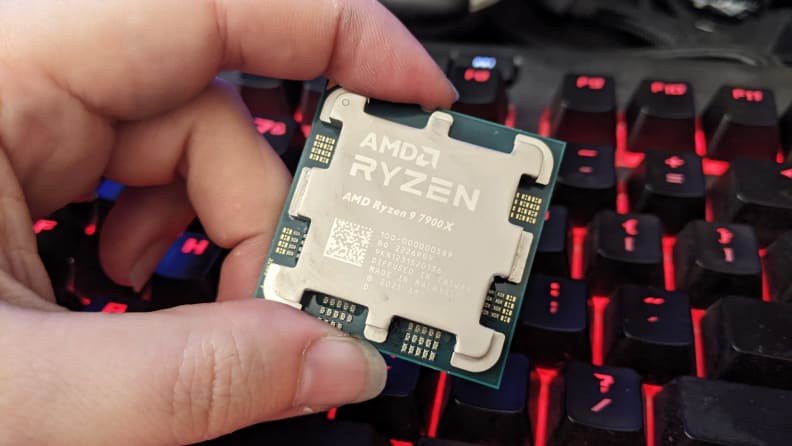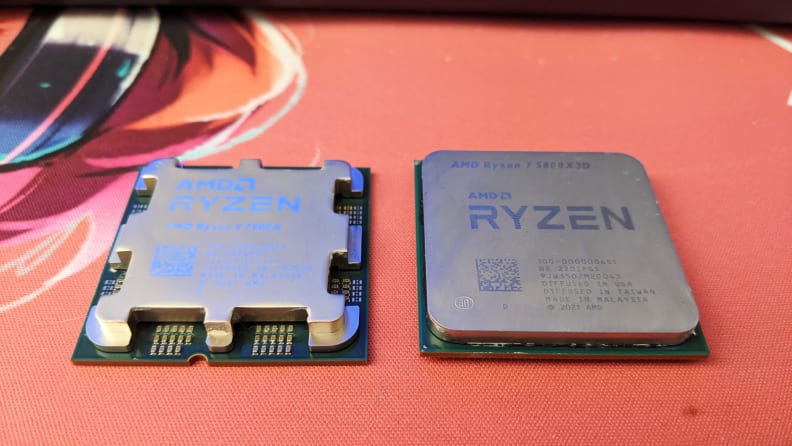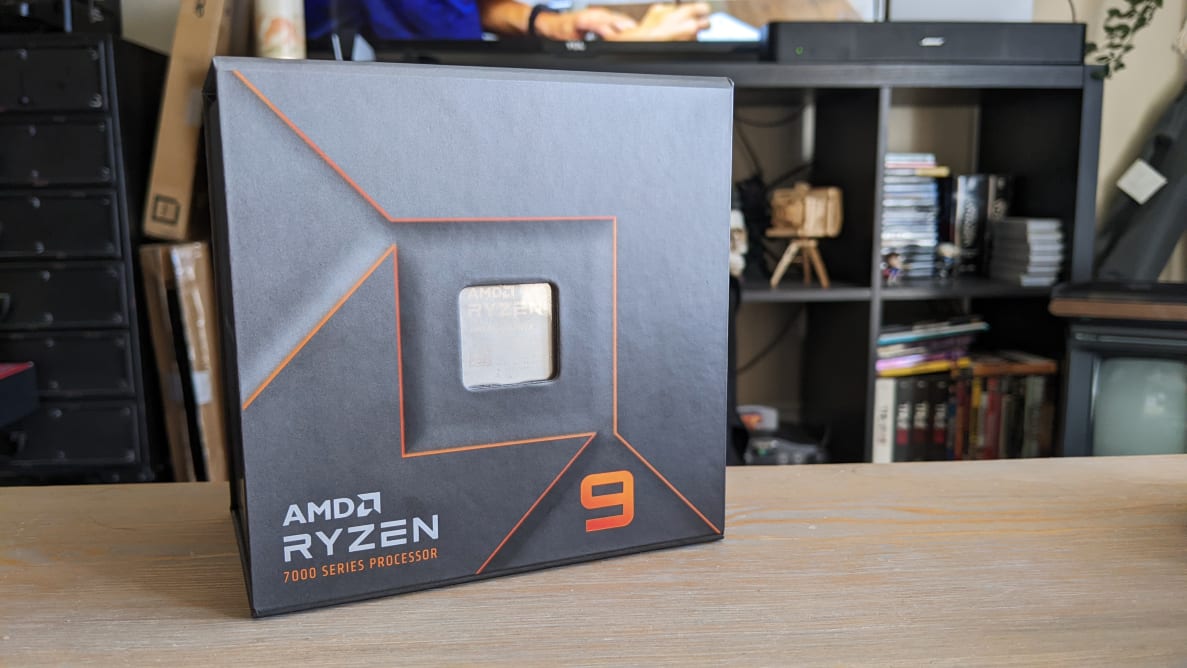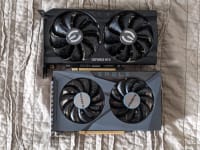Pros
-
Great overall performance
-
Compatible with existing coolers
Cons
-
Gaming performance plateaus
-
No DDR4 support
About the AMD Ryzen 9 7900X and Ryzen 7 7700X
Here are the specs of the processors we tested, respectively:
- Cores: 12 / 8
- Threads: 24 / 16
- Base clock: 4.7GHz / 4.5GHz
- Max clock: 5.6GHz / 5.4GHz
- Cache: 76MB / 40MB
- Max TDP: 170W / 105W
- Max operating temp: 95 C / 95 C
AMD’s new 7000 series processors currently come in four total configurations: Ryzen 5 7600X ($299), Ryzen 7 7700X ($399), Ryzen 9 7900X ($549), and Ryzen 9 7950X ($699).
Here are the specs of the AMD rig we used for testing:
- Processor: Ryzen 9 7900X / Ryzen 7 7700X
- Graphics: Nvidia RTX GeForce 3080 Ti / Nvidia GeForce RTX 3080 / AMD Radeon RX 6800 XT
- Memory: 32GB DDR5 -5200MHz Corsair Dominator Platinum RGB
- Storage: 1TB NVMe M.2 PCIe 4.0 Sabrent Rocket
- Motherboard: Gigabyte X670E Aorus Master
- Cooling: Corsair H150i Pro RGB 3600mm
- Power: Corsair RM 1000x
Here are the specs of the Intel rig we used for comparison:
- Processor: Intel Core i9-129000K
- Graphics: RTX 3080 Ti / RTX 3080 / RX 6800 XT
- Memory: 32GB DDR5 -5200MHz Corsair Dominator Platinum RGB
- Storage: 1TB NVMe M.2 PCIe 4.0 Sabrent Rocket
- Motherboard: Asus ROG Strix Z690-E Gaming Wi-Fi
- Cooling: Corsair H150i Pro RGB 360mm
- Power: Corsair RM 1000x
We also used AMD systems with the Ryzen 9 5950X and Ryzen 7 5800X3D for comparison, both with 16GB of G.Skill DDR4 RAM overclocked to 3600MHz.
What we like
Overall performance

AMD's Ryzen 7000 series processors have new architecture and a new look.
AMD’s new Ryzen 7000 series chips are just as fast, if not faster than Intel’s 12th-gen processors even with their fancy, hybrid architecture mixture of performance and efficiency cores. On average, the Ryzen 9 7900X was about 10-40 frames per second (fps) faster in gaming than the Core i9-12900K, depending on the game and display resolution. For instance, paired with an RTX 3080, the 7900X pulled 180 fps in Shadow of the Tomb Raider at 1080p at the highest graphical preset, while the 12900K managed 151 fps (the same as the 7700X). This is not surprising given our synthetic benchmark results.
The Ryzen 9 7900X pulls ahead of Intel’s Core i9-12900K in both single-core and multi-core performance—not by a lot, but enough to make tasks like 3D rendering, photo tagging, and video editing seconds faster. In our usual Blender CPU test that renders a 3D image of a BMW car, the Ryzen 7 7900X processed the image in one minute and 20 seconds, while the Core i9-12900K took one minute and 33 seconds. (The Ryzen 7 7700X isn’t too far behind either, taking one minute and 59 seconds.) That’s also faster than AMD’s previous-gen Ryzen 9 5950X’s time of one minute and 37 seconds.
We also ran a branched path tracing test, which calculates how a single lighting source splits and reflects off different surfaces. The Ryzen 9 7900X was five minutes and 15 seconds faster than the Core i9-1200, taking 12 minutes and 59 seconds to finish. (The Ryzen 7 7700X was about a minute and 15 seconds slower than the Core i9-12900K.)
The new LGA socket design
One of the biggest gripes I’ve had with AMD processors in the past has to do with how they were secured to the motherboard. There was a flimsy metal lever you pulled down to lock the processor in place, but anyone who has ever put too much thermal paste between the CPU and cooler knows the horrors of accidentally pulling the chip out of the socket while the lever was still engaged.
But like Intel’s chip socket, AMD now has a locking frame design to keep the chip in place just in case you use too much thermal paste. (You should not with these new processors, but more on that later.)
Beyond a more secure, physical connection to the motherboard, the Land Grid Array (LGA) socket has advantages over the Pin Grid Array (PGA) socket AMD has been using for its entire Ryzen line-up until now. LGA’s are flat on the underside while PGA’s have tiny pins that stick out, and LGAs can accommodate more connection points and higher power delivery.
For AMD’s new Ryzen 7000 series processor to reach the incredibly high clock speeds they boast, they need more power, and the LGA socket design is more accommodating for that purpose.
New socket, same size

Left to right: Intel Core i9-12900K, AMD Ryzen 9 7900X, AMD Ryzen 7 5800X3D.
AMD did not follow Intel’s footsteps when it redesigned its socket—thank goodness for that. When Intel released its 12th-gen processors last year, the physical size of its chips grew, and while the company said previous-gen CPU coolers would be compatible with its 12th-gen chips, you need to get a special standoff kit from the cooler manufacturer to actually make them compatible. That was the case in our testing, and we had some issues getting the cooler to press firmly against the CPU because of the new standoffs. (We weren’t the only ones.)
AMD’s Ryzen 7000 series chips are the exact same physical size as its Ryzen 5000 series and older processors. We had no issues getting our older cooler to work with the new chips and new motherboards, which makes upgrading from older Ryzen generations a much smoother process.
What we don’t like
The high-end processors are pointless for the average gamer

Surprisingly, the drop-offs don't make it harder to clean the thermal paste off the processor.
If you’re looking at the Ryzen 9 7900X and Ryzen 7 7700X specs and wondering how much gaming performance differs between the two, I’ll save you some time: it doesn’t. The max clock speed difference between the two is only 200MHz, or 5.6GHz to 5.4GHz, respectively. Since gaming is more reliant on single-core speeds than multicore speeds, this translates to the same in-game frame rates between the two chips, even if you use the same graphics card with both.
To get the best frame rates possible without manually overclocking the processor, I enabled the memory overclocking profile in the BIOS and set the CU overclocking to auto. I also used three different graphics cards in my testing, the RX 6800 XT, RTX 3080, and RTX 3080 Ti, and a mix of CPU-and GPU-intensive games to track performance as well as HWInfo to monitor clock speeds.
At 1080p on the ultra graphics preset (or highest), both the Ryzen 9 7900X and Ryzen 7 7700X (paired with the RTX 3080) get 119 fps in Far Cry 6, 108 in Total War: Warhammer 3, 91 in Hitman 3, 181 in Shadow of the Tomb Raider, and 91 in Cyberpunk 2077. Both get 48 fps when ray tracing ultra is turned on in Cyberpunk 2077. It’s the same story with the RX 6800 XT and RTX 3080 Ti; bumping up the GPU power does not change the frame rate difference between the Ryzen 9 7900X and Ryzen 7 7700X. Additionally, both the Ryzen 9 7900X and Ryzen 7 7700X are also slower in gaming performance compared to AMD’s Ryzen 7 5800X3D by about 10-20 fps.
If you are trying to save money on your next build, going with one of the new mid-range Ryzen processors like the 7700X or 7600X will be the way to go. By comparison, the 7700X costs $150 less than the 7900X, and the 7600X costs $250 less than the 7900X. $250, and even $150, is a good chunk of change you can put toward another part of your rig.
The Ryzen 7 5800X3D costs about $400 (not on sale), which is the same price as the Ryzen 7 7700X, but you will be missing out on a ton of multicore processing power if you go with the X3D chip instead.
For instance, it took the Ryzen 7 5800X3D about 14 more minutes to process the same virtual scene in our branched path tracing test (27 minutes compared to the Ryzen 7 7900X’s 14 minutes). The Ryzen 7 7700X was also faster in the same task by about seven minutes and 30 seconds.
Compatible with DDR5 only
This is one area where AMD is too forward-looking; its Ryzen 7000 series is only compatible with the current-gen DDR5 RAM standard, even though DDR4 RAM is still plentiful and cheaper. DDR5 prices are coming down, but DDR4 is still a better value.
DDR5 has a higher base speed and consumes less power, but it has higher latency, so that means the amount of time it takes for RAM to accept and transfer information to another hardware component takes longer.
But is there any effective difference between DDR5 and DDR4 for gaming? It depends on your PC’s configuration. In our tests with the Ryzen 9 5950X and Ryzen 7 5800X3D, we used DDR4 RAM with both of those chips and the same graphics cards (the RTX 3080 and RX 6800 XT)—and both of those configurations outperformed the 7000 series by an average of 10-20 fps.
Additionally, we must give Intel credit over AMD here for making its 12th-gen chips compatible with DDR5 and DDR4. If Intel does the same thing again with its 13th-gen, that gives the company a bigger lead over AMD in this case.
Should you buy AMD’s Ryzen 9 7900X or Ryzen 7 7700X?
Maybe, it all depends on your needs

Left: Ryzen 7000 series chip. Right: Ryzen 5000 series chip.
If you have the money to throw down on one of these processors, you won’t be disappointed. They have the fastest clock speeds we’ve seen in a consumer desktop processor as of this review’s publication, and AMD ensured its architectural changes would not become a headache to buyers who want to reuse their cooling solution. It’s also the fastest we have ever tested in multi-core processing.
If you are a content creator that needs a lot of multicore processing power, these are some of the best processors you can currently buy (pending Intel’s 13th-gen release). However, if your primary or sole purpose is gaming, anything above the 7700X (and perhaps the Ryzen 5 7600X) will have diminishing returns.
The Ryzen 7 7700X or Ryzen 5 7600X have the best value. Their prices are reasonable for the specs, so they are well-positioned to be the best value-minded picks of the silicon bunch. Plus, you’ll want to save some cash to buy DDR5 RAM since the Ryzen 7000 series is not compatible with DDR4. AMD has also pledged to support the new AM5 socket through 2025, so if you adopt the new processor now future motherboards should still support it. (Assuming AMD keeps the same promise it did with its AM4 socket.)
There is virtually no difference in gaming performance between the Ryzen 9 7900X and the Ryzen 7 7700X, but the 7700X costs $150 less than the 7900X. What’s more, the Ryzen 7 5800X3D costs the same as the 7700X and has better gaming performance, but the former has better performance in content creation applications.
There’s also a lot of merit to grabbing a last-gen Ryzen 9 5950X on sale; that chip, when paired with an RTX 3080, gets the same in-game performance as a Ryzen 9 7900X paired with an RTX 3080 Ti according to our tests. You could end up saving $20 or more on the 5950X and put that leftover money toward new keycaps or something else.
Meet the tester
Joanna specializes in anything and everything gaming-related and loves nerding out over graphics cards, processors, and chip architecture. Previously she was a staff writer for Gizmodo, PC Gamer, and Maximum PC.
Checking our work.
Our team is here to help you buy the best stuff and love what you own. Our writers, editors, and experts obsess over the products we cover to make sure you're confident and satisfied. Have a different opinion about something we recommend? Email us and we'll compare notes.
Shoot us an email



